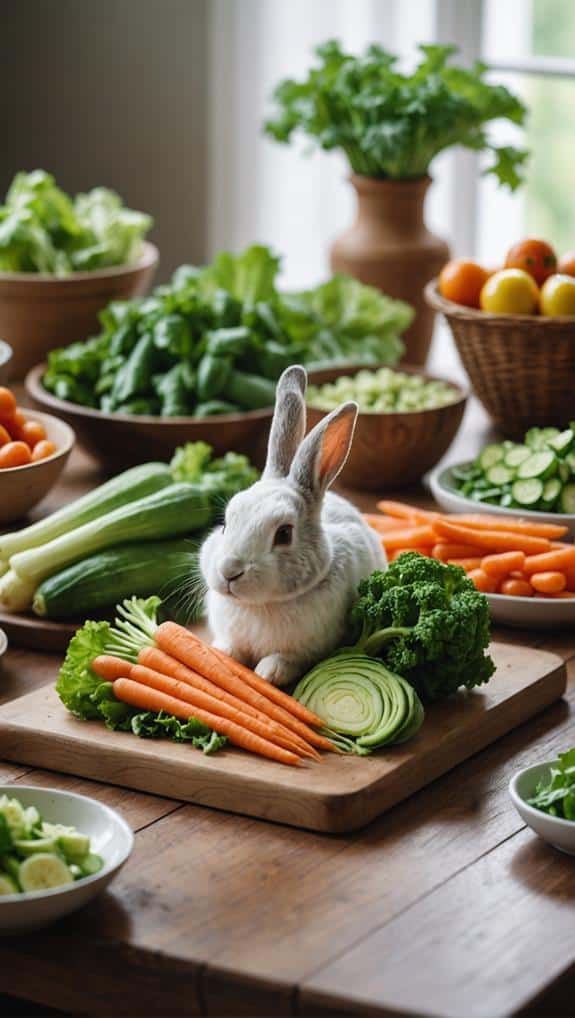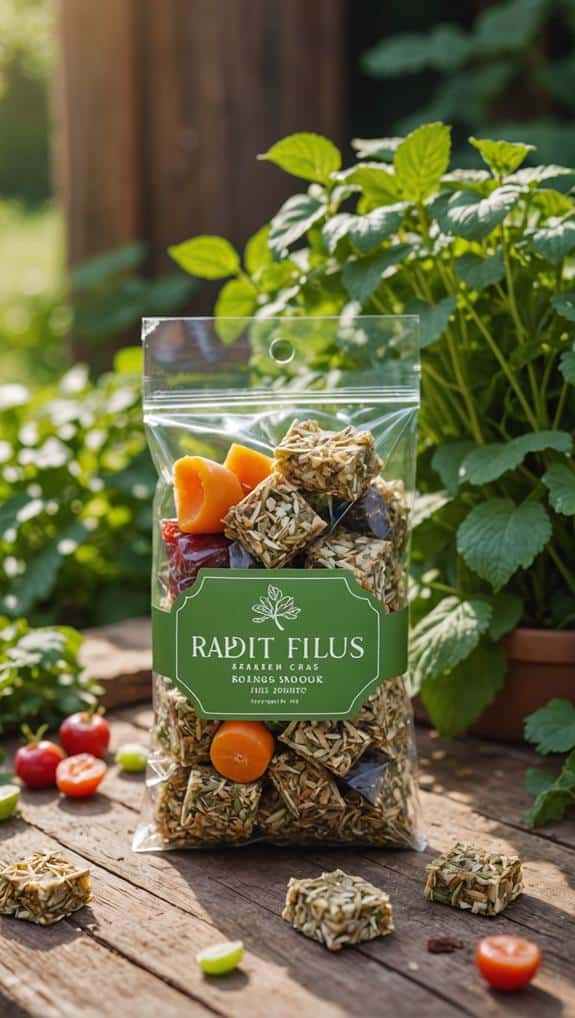Did you know that up to 60% of rabbits can experience digestive issues at some point in their lives? If you've got a rabbit with a sensitive tummy, finding the right soothing snacks can make all the difference in maintaining their health. You might be wondering which ingredients are best suited for their delicate digestive systems, or how to gradually introduce new foods without causing upset. Understanding these aspects is vital for keeping your furry friend comfortable and happy.
Contents
Understanding Sensitive Rabbit Tummies

Understanding your rabbit's sensitive tummy is essential for maintaining its overall health. Rabbits with sensitive tummies can experience serious digestive problems, including gas, bloating, and slow gut motility. A high-fiber diet is imperative for supporting digestive health and preventing sensitivity. To keep your furry friend comfortable, you need to manage its diet carefully.
Common triggers for digestive upset include sudden changes in diet, high-starch or high-sugar foods, and certain vegetables such as broccoli and cabbage. To avoid gastrointestinal distress, you must introduce new foods gradually. This slow shift allows your rabbit's digestive system to adjust without overwhelming it.
A high-fiber diet is imperative for supporting digestive health. Aim to provide unlimited hay and limit high-quality pellets, as these promote ideal gut function and reduce the risk of sensitivity.
Regularly monitoring your rabbit's behavior and droppings is also essential; any significant changes can indicate underlying dietary issues that may require veterinary attention.
Recommended Soothing Ingredients
When it comes to soothing snacks for rabbits, selecting the right ingredients is vital for their digestive well-being. High-fiber options, like Timothy hay and oat hay, should be staples in your rabbit's diet.
These hays promote digestive health and regularity, which is indispensable for sensitive tummies. Including high-quality digestive supplements can further enhance their diet and support gastrointestinal health.
Incorporating fresh herbs can be incredibly beneficial. Parsley and basil are safe choices that not only soothe but also provide essential nutrients.
Additionally, small amounts of dried herbs such as chamomile and peppermint can offer calming effects and support digestion when given as treats.
You can also introduce leafy vegetables to your rabbit's diet carefully. Baby spinach or romaine lettuce in small portions can provide moisture and fiber without overwhelming their delicate digestive systems.
Lastly, consider including a small serving of plain, unsweetened pumpkin puree in their snacks. This ingredient is known for its high fiber content, which helps promote proper digestion and alleviates intestinal irritation.
Gentle Vegetable Options

Choosing gentle vegetable options is equally important for rabbits, especially those with sensitive tummies. Providing the right vegetables can help prevent gastrointestinal distress and support their overall health.
It's vital to introduce new foods slowly and monitor your pet rabbit's reactions to guarantee they're well-tolerated. Remember that while carrots are often thought of as a favorite treat for rabbits, they should only be given in moderation due to their high sugar content, as excessive amounts can lead to health issues like obesity and digestive disorders.
For a more balanced diet, consider incorporating safe leafy greens as well, such as dark leafy lettuces.
Here are four gentle vegetable options you can consider:
- Romaine Lettuce – This leafy green is low in calcium and high in moisture, making it perfect for sensitive digestive systems.
- Cilantro – With its mild flavor, cilantro can be a delightful addition to your rabbit's diet, offering a tasty treat without causing upset.
- Parsley – Another leafy green option, parsley is rich in vitamins and generally easy on the stomach.
- Pea Pods – These provide essential nutrients and are gentle on the tummy, making them an excellent choice for sensitive bunnies.
Always wash fresh vegetables thoroughly to remove any pesticide residues. Avoid cruciferous vegetables like broccoli and cabbage, as they can produce gas and exacerbate discomfort in your pet rabbit.
Safe Herbal Treats
Herbal treats can be a fantastic addition to your rabbit's diet, offering both digestive benefits and essential nutrients.
Safe options like parsley, basil, mint, and cilantro are gentle on sensitive tummies and can be served fresh or dried.
To guarantee a smooth introduction, start with small amounts and always choose pesticide-free herbs that are thoroughly washed.
Benefits of Herbal Treats
Rabbits thrive on a varied diet, and incorporating safe herbal treats can greatly enhance their well-being. These treats serve multiple purposes, offering not just flavor but also crucial benefits that promote health, especially for rabbits with sensitive tummies.
Here are four key advantages of herbal treats:
- Digestive Support: Herbs like parsley, basil, and mint can naturally alleviate gas and discomfort, making them ideal for sensitive stomachs.
- Vitamins and Minerals: Fresh herbs provide important nutrients, adding essential vitamins and minerals to your rabbit's diet without the risk of overfeeding.
- Kidney Health: Gentle diuretics, such as dandelion and milk thistle, help flush out toxins while being easy on your rabbit's stomach.
- Mental Stimulation: Mixing dried herbal treats with hay encourages foraging behavior, keeping your rabbit engaged and active.
When you decide to introduce herbal treats, do it gradually. This approach helps your rabbit adjust without digestive upset.
Always confirm the herbs you offer are clean and free from pesticides to safeguard their health. By choosing the right herbal treats, you're taking significant steps to promote your rabbit's overall well-being.
Recommended Herbal Options
Several safe herbal options can enhance your rabbit's diet while promoting health and well-being. Fresh herbs like parsley, basil, mint, coriander, dill, rosemary, sage, and thyme not only serve as healthy treats but also provide digestive benefits, especially for rabbits with sensitive tummies.
Introducing these herbs gradually is vital, allowing you to monitor your rabbit's tolerance and avoid any potential sensitivities.
Dried herbs, such as dandelions and plantain, are also excellent choices. They offer similar health benefits and are widely available in stores. Incorporating dried herbs into your rabbit's diet can be a convenient way to provide variety and nutritional value.
To further encourage foraging behavior, scatter herbs within your rabbit's hay. This method promotes mental stimulation and helps increase hay consumption, which is important for maintaining digestive health.
Always confirm any herbs you use, whether foraged or purchased, are free from pesticides and contaminants to keep your furry friend safe.
Preparation and Serving Tips
When it comes to serving safe herbal treats, ensuring your rabbit enjoys them while benefiting from their nutritional value is key. You can introduce fresh herbs gradually, allowing you to monitor digestive responses and optimize their health. Here are some preparation and serving tips:
- Choose fresh, pesticide-free herbs: Select options like parsley, basil, and cilantro. Always wash them thoroughly to eliminate contaminants that might irritate sensitive tummies.
- Serve in small portions: Aim for about 1-2 tablespoons of fresh herbs daily. This helps prevent digestive upset while providing adequate fiber for gut health.
- Incorporate dried herbs: Offer soothing snacks like plantain and dandelion, which stimulate appetite and offer digestive support without overwhelming your rabbit's stomach.
- Encourage foraging behavior: Scatter dried herbs within your rabbit's hay. This not only enhances hay appeal but also promotes mental stimulation and natural foraging instincts.
Low-Sugar Fruit Treats

For rabbits with sensitive tummies, low-sugar fruit treats can be a delightful addition to their diet, offering both flavor and health benefits. Consider options like apples (without seeds), blueberries, and strawberries. These fruits can be served in small portions, ideally around 1-2 tablespoons per day, guaranteeing they comprise no more than 10% of your rabbit's overall diet.
Introducing fruits gradually is vital. Start with a tiny amount to monitor for any digestive reactions before increasing the portion size. Always wash fruits thoroughly and remove any seeds or pits. This step is essential to avoid toxins that could harm your rabbit.
High-fiber fruits, such as raspberries and blackberries, are preferable. They provide valuable digestive benefits while remaining low in sugar.
By choosing the right low-sugar fruit treats, you can enhance your rabbit's diet without compromising their sensitive digestive system. Remember, moderation is key; too much fruit can lead to digestive upset.
Homemade Snack Recipes
Building on the idea of low-sugar fruit treats, homemade snacks can be a fantastic way to cater to your rabbit’s specific dietary needs while ensuring they enjoy a variety of flavors. By incorporating fresh ingredients such as dried fruits, vegetables, and herbs, you can create delicious and healthy snacks for rabbits that not only please their palate but also provide essential nutrients. Experimenting with different combinations can keep snack time exciting, allowing you to discover what your furry friend enjoys most. Remember to offer these treats in moderation to maintain a balanced diet and promote overall health.
When you create these soothing snacks, you'll provide gentle options that support their sensitive tummies. Here are some easy and nutritious homemade treat ideas:
- Pureed Pumpkin or Mashed Banana: These fruits are gentle on your rabbit's digestive system and can be offered in moderation for a tasty treat.
- Frozen Vegetable Cubes: Freeze pureed spinach or cooked zucchini in ice cube trays. This invigorating snack is easy to digest and great for warm days.
- Dried Herb Treats: Small pieces of chamomile or peppermint can be made into treats. These herbs are known for their calming properties, helping to soothe digestive discomfort.
- Timothy Hay Paste: Blend timothy hay pellets with water to create a soft paste. This comforting snack maintains fiber intake while being gentle on their stomachs.
These homemade snacks not only cater to your rabbit's sensitive digestive system but also introduce a delightful range of flavors.
Store-Bought Treat Considerations

Choosing the right store-bought treats for your rabbit can substantially impact their digestive health, especially if they've sensitive tummies. When selecting treats, prioritize those that are high in fiber and made from wholesome ingredients. Always check the ingredient list to avoid added sugars and artificial additives, as these can exacerbate digestive issues.
Look for treats made from safe ingredients like hay, vegetables, or herbs. It's best to steer clear of corn, seeds, and other fillers that can upset your rabbit's delicate digestive systems. Trusted brands such as Oxbow and Small Pet Select often provide healthier treat options that cater to your rabbit's dietary needs.
Remember to limit treat portions to 1-2 tablespoons per day to prevent overconsumption, which might lead to gastrointestinal problems.
Dried herbs or hay-based treats specifically formulated for rabbits can be excellent choices, promoting healthy digestion while offering a natural snack alternative. By making informed choices, you can guarantee that your rabbit enjoys tasty treats that support their overall well-being and comfort.
Monitoring Dietary Reactions
When introducing new snacks to your rabbit, it's vital to monitor their reactions closely.
Pay attention to any behavioral changes, as well as the consistency of their droppings, to help identify potential dietary triggers.
Keeping a detailed food diary can provide valuable insights into your rabbit's sensitivities and overall health.
Identifying Dietary Triggers
Identifying dietary triggers in rabbits requires keen observation and a systematic approach to monitoring their reactions to food.
Since rabbits have sensitive digestive systems, it's crucial to be attentive to any signs of discomfort or distress after they eat.
Here are four steps to help you effectively track dietary triggers:
- Monitor Droppings: Keep an eye on your rabbit's feces. Diarrhea or soft feces can indicate food sensitivities.
- Keep a Food Diary: Document what your rabbit eats and any digestive upset that follows. This helps track which foods lead to issues.
- Gradually Introduce New Foods: Always add new foods one at a time in small amounts. This method allows you to pinpoint sensitivities without overwhelming their system.
- Consult with a Veterinarian: If you notice any persistent problems, consult with a veterinarian. They can provide guidance tailored to your rabbit's needs.
Observing Behavioral Changes
Observing behavioral changes in your rabbit after introducing new foods is essential for understanding their dietary reactions. You should closely monitor your rabbit for signs of digestive discomfort, such as reduced activity or hiding. These behaviors can indicate sensitivity to new foods that don't sit well with their stomach.
Pay attention to their droppings; smaller or softer fecal pellets may signal gastrointestinal distress, while an absence of droppings for 12-24 hours demands immediate veterinary attention. Additionally, be alert for signs of gas, like a swollen abdomen, teeth grinding, or lethargy, as these may point to dietary issues or intolerances.
To manage your rabbit's diet effectively, consider keeping a food diary. Document any correlations between specific treats or vegetables and observed behavioral changes or digestion. This will help you identify potential sensitivities over time.
When introducing new vegetables, do so one at a time, observing reactions over 24-48 hours to avoid upsetting their gastrointestinal balance. By being vigilant about these changes, you can guarantee your rabbit's dietary needs are met and their well-being maintained.
Tips for Gradual Introductions

Introducing new snacks to rabbits requires a careful approach, especially for those with sensitive tummies. To guarantee a smooth introduction and monitor your rabbit's digestive response, follow these tips:
- One at a Time: Introduce new snacks or vegetables one at a time. Wait 24-48 hours before adding another, so you can easily identify any adverse reactions.
- Start Small: Begin with small portions of soothing snacks, like soft hay-based treats or plain, unprocessed vegetables. This helps acclimate their digestive system gradually.
- Wash Thoroughly: Always wash new vegetables and snacks to remove pesticides or contaminants that could exacerbate digestive sensitivities.
- Keep a Journal: Document each introduction in a journal. Note any digestive issues or changes in behavior to pinpoint problematic foods effectively.
Prioritize low-sugar, high-fiber options like parsley, basil, or small bites of leafy greens.
These are generally easier on your rabbit's digestive system compared to fruits or starchy vegetables.
Final Thoughts
Ultimately, nurturing your rabbit's sensitive tummy requires careful selection of soothing snacks. By prioritizing high-fiber hays and introducing gentle vegetables, herbs, and low-sugar fruits, you can support their digestive health. Remember, the theory that gradual dietary changes prevent discomfort holds true; your rabbit's tummy will thank you for it. Keep a close eye on their reactions, and you'll create a balanced, enjoyable diet that promotes their overall well-being while avoiding distressing symptoms.






